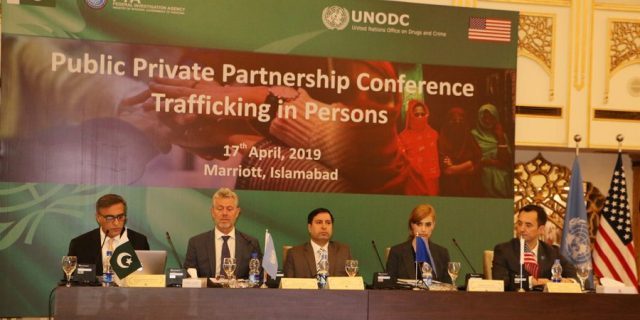News Desk
The Federal Investigation Agency (FIA) and the United Nations Office on Drugs and Crime (UNODC) discussed ways to prevent human trafficking at a conference.
The UNODC, with the support of the United States Department of State Office to Monitor and Combat Trafficking in Persons (USJ/TIP), organized its second Public-Private Partnership Conference on Trafficking in Persons. The conference has been arranged in collaboration with the Federal Investigation Agency (FIA) of Pakistan.
The UNODC Pakistan Office has been assisting the Government of Pakistan for over 35 years with the objective of assistance in overcoming common challenges and in meeting international obligations.
Naveed Ahmad Shinwari, the UNODC consultant, gave a presentation on the roles, responsibilities, and initiatives of civil society, NGOs, and the private sector in combatting trafficking in persons.
The aim of the conference is to enhance collaboration among key government stakeholders and the private sector which includes civil society, non-governmental organizations, and private corporations.
It is a matter of fact that women and children in Pakistan are trafficked for sexual exploitation, sometimes in the form of forced marriages. To help minimize trafficking in persons, the UNODC and the FIA have been working in close collaboration for many years.
As partners both the UNODC and the FIA realize it is important to take all stakeholders, from both public and private sectors, onboard to fight trafficking in persons.
Read more: FIA formulating a million rupee action plan to curb Human smuggling…
For this purpose, the conference was organized in Islamabad; and numerous senior government officials, law enforcement officers, members of civil society, private sector organizations, non-governmental organizations, the media, and other UN agencies were invited to participate: to recognize and collaborate with the struggle to combat trafficking in persons.
Significance of Public-Private Partnership
Ahmed Mukkarram, Additional Director General Immigration FIA, in his opening remarks appreciated the efforts of the UNODC and the assistance provided by the US Department of State. He stated, “It is with these efforts that the law against trafficking in persons has been enacted in Pakistan.”
Mukarram added that “such engagement helps improve communication and raise awareness of relevant stakeholders on the issue. It helps recognize the victims and enhances the delivery of services for the protection of victims of trafficking in persons and broadens access to available protection services.”
Several participants expressed their resolve to continue collaboration with public partners: to enhance understanding of human trafficking and of the role of the private sector.
Davor Raus, Crime Prevention and Criminal Justice Officer, UNODC Vienna expressed his appreciation of the participating stakeholders. He emphasized the importance of public-private partnership and said “Partnership between governments and the private sector in preventing and fighting all forms of trafficking in persons has become the need of the hour. It is with collective efforts that we can defeat the menace and make the world a safer place.”
Raus added that “UNODC looks to civil society and private sector organizations to contribute for raising awareness to prevent trafficking in persons.” Mufakhar Adeel, additional director (immigration) FIA, spoke on international and national norms and practices. He briefed the participants on the agency and its work to control this crime.
Read more: Smugglers pave path for migrants from Africa to Europe
Need to Address the Issue Holistically
Naveed Ahmad Shinwari, the UNODC consultant, gave a presentation on the roles, responsibilities, and initiatives of civil society, NGOs, and the private sector in combatting trafficking in persons. He said, “every sector is making efforts to fight this menace, but no coordination exists between relevant stakeholders to address this issue holistically.”
Lucy Coburn, US Embassy Islamabad, delivered a presentation; while Samantha Novick and Andrea Balint, US State Department’s Office to Monitor and Combat Trafficking in Persons, participated in the conference. Several participants expressed their resolve to continue collaboration with public partners: to enhance understanding of human trafficking and of the role of the private sector.
Read more: National action plan against drugs addiction
The conference itself was organized with the financial support from the US Department of State Office to Monitor and Combat Trafficking in Persons.














